- Home
- Hugo Hamilton
Headbanger Page 2
Headbanger Read online
Page 2
Let’s see your footwear then. Perry’s sneakers had massive tongues; maybe they were meant to make him look like one of those mythical horses with white wings on their hooves.
Come here, Pegasus, you little bastard. And Coyne made him stand up while he examined the soles like a blacksmith.
Organic soil, eh?
I want to speak to my solicitor.
Coyne dropped the hoof and Perry’s shoe made a tiny squeak on the tiled floor. But he wasn’t finished, and Coyne then produced a small bag of soil.
Exhibit B, he shouted triumphantly as he pushed the soil bag into Perry’s face. What was happening? Was it the adrenalin from the chase still surging like a narcotic around his head? Coyne suddenly lost his patience and began trying to feed Perry some of the soil, stuffing it into his mouth as though he was concerned about some nutritional deficiency, until some of the other Guards came over to restrain him.
You’ve made your point, Pat.
Perry was spitting out the black mixture of clay and saliva, proclaiming his innocence. Grimacing at the taste of wholefood.
At this point, Coyne felt a bit of a shit. He was only dealing with small fry. He had let himself down and felt his audience had suddenly switched over to Come Dancing in utter desperation. McGuinness even handed Perry a Kleenex, for God’s sake, and Coyne held his palms out to his inner public, appealing that he was only human too. There is only so much a man can take. But his ratings had plummeted and his audience were all passed out on the sofa, yawning, half watching a couple strutting around in a high-bottomed tango.
As usual, the real crime was happening somewhere else. Public enemy number one, Berti Cunningham, was driving a spanking new Range Rover through the streets of the city. Just about the same time that Coyne was carrying out the special feeding programme at Irishtown Garda station, Berti Cunningham, his younger brother Mick Cunningham and their chief accountant Charlie Robinson were stopping briefly along Baggot Street so that Berti could pick up a kebab. They were the untouchables. Nobody could lay a finger on them. Berti strolled into Abrakebabra inhaling the smell, drawn to the counter like a fly to a ketchup stain. He had a thin, wiry sort of frame as though he had been underfed as a child. Raised on sliced bread and jam. Chip sandwiches, maybe. Where other crime lords needed a drink before they went out on a job, Berti Cunningham, or the Drummer as they all called him, needed some really evil piece of food, something that would set off a vicious clash of gastric fluids, leaving him with the stench of a tannery on his breath and a slight disfiguration at the edges of his mouth that only barely concealed the boiling bile.
His brother Mick was a little less ugly. Small goatie beard and a reversed baseball cap. He sat at a table with Chief, a stout man with a shaven head, wearing a kind of happy, vegetarian shirt, with lots of colours. It was more like a pizza really, with braces holding up his jeans. They had left Drummer’s two Rottweiler dogs in the back of the Range Rover, panting with their tongues hanging out. They sat looking up at MTV – three women standing knee deep in the sea singing: Don’t go chasing waterfalls, whatever the fuck that was supposed to mean. Right underneath a sign that said: No alcohol allowed on the premises, Chief cracked open a can of beer while Drummer ordered three kebabs, one for himself with lettuce and garnish, and two plain kebabs for his Rottweilers. Abrakebabra. Sure it was only dogfood anyway.
Carmel sat at the back of the class, listening to the art teacher, Gordon Sitwell, with vocation written all over her eyes. An unfinished painting was spread out in front of her and she was mixing up some paint, spellbound by eagerness, soaking up every word that Mr Sitwell uttered as though he was carefully distributing some precious linseed oil you could not afford to lose even one drop of.
Sitwell was a gentleman with a grand accent that somehow went with all that art talk. He had a squat build and wore a green corduroy jacket. He seemed to draw inspiration from his earlobe, which he squeezed gently as he spoke. He was there to spout erudition and to urge his disciples on to greater things. He kept walking up and down the room, talking as though he had a direct link to the great masters, stopping occasionally to hold up his index finger, knocking against an invisible urn and waiting to hear a faint musical note. He was just the kind of art teacher Carmel had expected, somebody with grey temples who was utterly lost in culture.
Sometimes he made eye contact with her, just to see if she understood what he was saying, and she automatically nodded. Once or twice he smiled as he wandered around the classroom, leaving behind him an intoxicating whiff of aftershave, which had to be called something like ‘Renaissance’ or ‘Rubens’ and must have been made with some ancient musk extracted from the entrails of a mythical animal. A sphinx or a unicorn. It curled around Carmel’s nostrils and inspired her to carry on working on an evening sky over the sea, with a tree to one side. Nothing too fancy. Keep it simple.
Nice, gentle brush strokes, Sitwell was saying. Let me see the brush swing a little in your hand. Remember that painting is like telling a story. The colours are your words.
He turned his back and walked away as though he was leaving the room, then swivelled round dramatically and stopped to look everyone in the eye, individually. Some of the people had come back for a second year and knew by the sleepy grin on his face that he was about to say something funny.
Remember, ladies. It’s not a powder puff you’re holding, and everybody laughed in recognition as though they had heard this one before. It’s an instrument of self-expression.
And when he came up behind Carmel the next time, he leaned over with his medieval musk and urged her to use some more dramatic colour for the sky. Something really sensuous. A fiery cobalt, perhaps?
That’s how it started, Coyne was telling the lads at the station. With tribal rituals.
He was writing in the details on the arrest sheet and stopped for a moment to tell the other members one of his little anthropological facts. Sergeant Devaney was listening with a sceptical smile on his face, buttocks perched on a desk. Life on Earth, with Pat Coyne.
That’s how all that art and culture began in the first place. This tribe of people where all the men go out together to have a communal crap.
You’re taking the piss, McGuinness said.
I swear, Coyne insisted. Every morning, all the men go out and leave these little sculptures on the landscape. Defecation missions they called it. I read all about it. It’s only much later that they began to use materials like wood and paint.
Coyne could not remember where he had developed this obsession with facts. Probably at school, as a form of protection. To fit in with the schoolboy hierarchies. It resulted in a real interest in nature, and he still borrowed books and anthropological videos all the time. He still bought the National Geographic and was deeply committed to the environment; anything that affected the future. But none of his knowledge ever brought him closer to people. He had difficulty communicating his vision of the universe to his colleagues. He was not one for bending reality to the demands of story-telling, and in the end, always found himself alone, staring out from his own mind as though he sat on a raft that would never reach the shore. It seemed as if the other Gardai in the station were all listening to him from the far bank.
You wanker, Coyne. You’re making this up.
I’m telling you, it’s a well-known fact, these lavatory parties in the forest. Can’t remember the name of the place.
But Coyne saw them all gazing at him incredulously, as though he was beyond rescue this time. Out of reach. At the mercy of a tide of Garda realism. Maybe it was the way he told it. But as usual, he felt the awkwardness of drawing an unspoken comparison between the actions of tribal men and the toilet-trained men of Ireland with whom he worked. Telling them the unenhanced truth. We’re all a bunch of civilised shitters when it comes down to it, each one of us proclaiming our identity, marking our space in the world through waste. It was clear that nobody had any idea what the hell
Coyne was going on about. Where was the joke?
Out in the real world, Drummer Cunningham and his gang were making their way along the canal down to Percy Place. Mick Cunningham had taken over the wheel of the Range Rover to allow Drummer to finish off his mobile meal. The Rottweilers had already inhaled theirs. As they pulled up outside a house in flats, Drummer got out and threw the kebab wrapper on to the pavement as much as to say: this is my city. I’ll throw my shite around if I like.
Upstairs, in a small apartment facing on to the street, Naomi Keegan was lying in a heap along the bed. She was still in her dressing-gown and the ring on the doorbell was her first contact with the outside world that day. Up to then she had successfully been able to remove reality by watching MTV. Her mind was a sponge, soaked in senseless images, heaving with the endless motion of limbs and lyrics. She went to the window, opened it and threw down the key. Then went back to lie on the bed again with a litre bottle of Ballygowan. Not so much to drink it but to hold it like a teddy bear or some kind of comfort toy that offered a vague notion of innocence and purity.
She was around twenty-five and had been a student of architecture at one stage. A drawing board in the corner of the room was submerged under a pile of clothes and personal items. It had also been misused more frequently as a surface from which she snorted whatever substance Drummer brought to her. A rolled-up James Joyce note was stuck in a penholder as the most essential implement. She was the architect of her own misfortune was the last sentence she heard from her South Dublin parents. To them, the sight of their daughter with an earring in her eyebrow and black fingernails was the end of her education. Not to mention the tattoo on her backside. That was a step beyond.
She could smell the kebab coming up the stairs and finally decided it was time to take another drink of water to recover some real sense of purity. Drummer came in and gave her the shite and onion smile. Looked around with disgust at the state of the room and pushed a mug away with his foot. Can I touch you there was on MTV at that moment. Michael Bunburger Bolton floating down some tropical river in a white suit, looking for some woman washing her hair in a waterfall for fucksake. Drummer made a little joke about the lyrics which Naomi ignored until he passed her a tab and she began to perk up. Then he went to the wardrobe and chose some clothes; a gold skirt and a thin black pullover.
I’ve got a job for you, he said.
Berti, please. Don’t ask me. I’ll do anything.
Just a little dance, baby. That’s all.
She looked at him, and he smiled as though there was a VIP lounge in the back of his head that nobody ever got into. Even in matters of sex there was a Bluebeard room in Drummer’s mind which you didn’t want to investigate. Some young one had been turned into a kebab and hidden under the floorboards in the past maybe. A challenge to all women. Please discover me. Try and get into my last VIP lounge and find out what no woman has ever seen before.
He was already pulling her off the bed, taking the fizzy water from her and forcing her to get dressed. Slapped the tattoo on her backside just a little too hard to pass for affection, and while Naomi got dressed, he began to dance to the music on the TV. Some kind of profane jerky movements that made him look like he was suffering a mild form of tropical tarantism. He was a shite dancer. It was Tai Chi meets Michael Jackson, holding his crotch and thrusting forward like he’d just received a kick in the sphincter. His body just mocked everything that was aesthetic.
Carmel’s art class was coming to an end. Everybody was beginning to wash brushes and put everything away while Mr Sitwell stood behind her, commenting on her tree.
It looks like a chestnut, or an oak, he said. Perhaps you could give it a little more body. Make it look stronger, more muscular. If you get my drift?
Carmel looked up. She didn’t know what he meant.
Try a bit of maroon or burgundy, he said, taking her hand and guiding the brush towards the paints, dabbing and mixing with great skill, then applying thin downward lines of burgundy along the tree trunk.
Brilliant, she thought. He had transformed the painting and was already walking away again, talking to the class in general.
Every object has its own personality. Every object has its own dark, romantic secrets inside. When you draw an oak tree, it should look like a mystery man. A tall, handsome, muscular body. You should want to hug him, ladies.
They all laughed. Carmel blushed. The cheek of him.
Superintendent Molloy was in a strange, elated mood that evening. With good reason. He had finally broken through the wall of silence which surrounded Drummer Cunningham’s deeds. He was excited by the fact that he now had a conviction in sight. A key witness, Dermot Brannigan, had turned police informer and was prepared to talk in court. Not so much a supergrass as a disaffected former associate of Berti Cunningham’s who had given Molloy more than he needed to end the Drummer’s reign.
When it came to the armed robbery and the case of Joe hatchet-man Perry, that was a different matter. His lawyer came into the station ranting about his client being assaulted. Superintendent Molloy said there was no harm done and he was happy to release the suspect to show that the Gardai were being reasonable about the whole affair. The lawyer was standing in the office with a long face on him; you’d think it was he who had been force-fed the organic muck. OK, Coyne had gone a little too far on the high-fibre diet, but after risking life and limb to arrest the little bastard, Molloy was now deciding not to have him charged.
He was just helping us in our enquiries, Molloy said.
He has his rights, you know, the lawyer complained. I’m considering a case of serious harassment.
Not at all, there’s no need for that, Molloy brayed. We’ll be releasing him right away. We’re just going through the formalities.
My client has suffered deep distress, the solicitor added.
Well, he shouldn’t be waving his hatchet around the post office then, Coyne said, finally losing his head.
What are you talking about, the solicitor fought back. My client was visiting his sick grandmother this afternoon.
So that’s where he got the muck on his shoes. That bastard is guilty and you know it.
Coyne found himself pointing his finger straight at the lawyer. But it was like touching an electric fence. Once again he felt his audience had deserted him as though the only person in the world who would understand him was his wife, Carmel. She was there in the audience, about five or six rows back with her crisps and her toffees; a devoted fan with her knees up against the seat in front encouraging him. But Coyne had already gone too far and Superintendent Molloy was urging him to calm down.
Everything is under control, he said.
Coyne couldn’t believe it. What was the point in him half killing himself running over those garden walls? As far as he was concerned, the legal profession only interfered with the administration of justice.
Just keep him away from my client, the lawyer said.
And afterwards, when the lawyer was gone, Superintendent Molloy took the opportunity to make a little speech of his own. Telling Coyne he wasn’t up to it any more. He had lost his balance and needed to relax. Should go down the country for a few days.
That’s not the way to go after these fellas, Molloy said. You can’t take any short cuts.
Like Coyne’s own father, Superintendent Molloy came from West Cork. Those county by county alliances throughout the Garda ranks had once established a bond between them, protecting Coyne, keeping him in sight of promotion. Molloy was taking on the role of a lost father figure, using the same tired country clichés.
Superintendent Molloy was a true redneck Garda. His hair crossed over from one side of his bald head to the other, like a lid or a trapdoor that had to be put back in place every time he went out in the wind. A hair-door is what it looked like, with a hinge at the side of the head, just above the temple. And Coyne stared at the mole jus
t under the super’s nose thinking, how does he shave? He imagined Molloy shaving the mole off and a fountain of blood gushing out. Moleshaver Molloy, walking around all day with a plaster on his face with the blood still seeping through.
You’ve got to play by the rules, Moleshaver said like a mantra.
I’ll get him one of these days, Coyne vowed.
Look, Coyne. We’ve gone through this before. You can’t lean on a suspect like that. Everybody knows he’s guilty, but he’s got a smart lawyer. Works for big-time sharks like the Cunninghams as well. Lay off until you’ve got something concrete.
Molloy leaned back, touching the tips of his fingers against each other, shampooing some invisible head in front of him. Coyne could see his own father, with the braces, and the rings holding up the sleeves of his shirt. He could smell the ancient tube of shaving cream, as though it was against the principles of the new republic to change to foam shaving lotion. Molloy took in a deep breath and leaned forward again, with purpose.
A word of advice, Pat. It’s like a fart in the sauna. Unless you catch the fucker at it, forget it. It’s the legal system in this country. He didn’t get away with much anyhow.
That’s not the point, Coyne snapped back in amazement. We can’t just let him go.
Forget Perry, Molloy insisted. We’ve got Brannigan talking. He’s under protective surveillance at the moment. You know what this means, Pat.
The Drummer.
Moleshaver looked across his desk with great Garda pride. Then he got himself ready to deliver an even more profound piece of advice.
You see, you’ve got to be able to connect the shite back to the arsehole it came from, he said.
Now that was ten per cent extra talk. That was the new improved formula language. As though Moleshaver had put forward the greatest ecological message of our time. The solution to pollution. Connect the shite back to the arsehole it came from. Molloy winked, and Coyne could not help being impressed by the impact of this new visual illustration. He liked it. It rounded off the faecal discussion earlier on. An inspiring concept which had a crisp cinematic feel to it, like the final words before a deadly subversive mission. Go for it, men. There was nothing to add, only action.

 Dublin Palms
Dublin Palms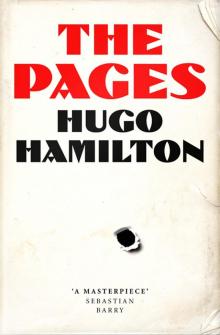 The Pages
The Pages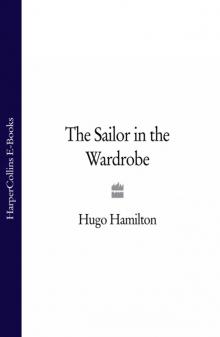 The Sailor in the Wardrobe
The Sailor in the Wardrobe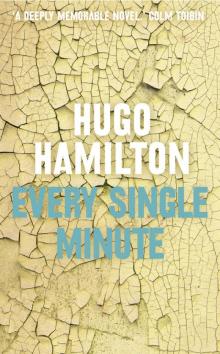 Every Single Minute
Every Single Minute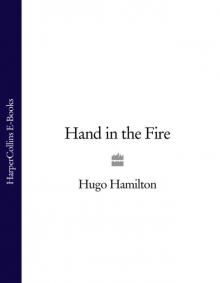 Hand in the Fire
Hand in the Fire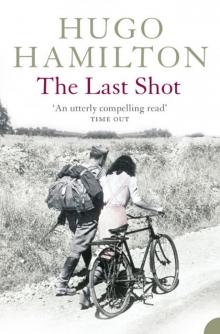 The Last Shot
The Last Shot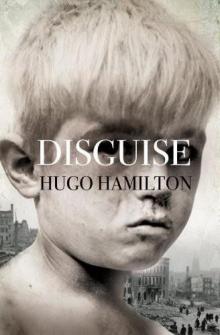 Disguise
Disguise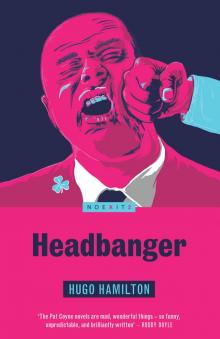 Headbanger
Headbanger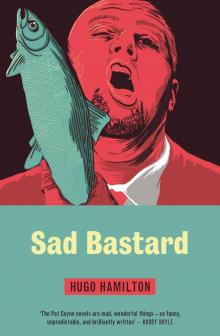 Sad Bastard
Sad Bastard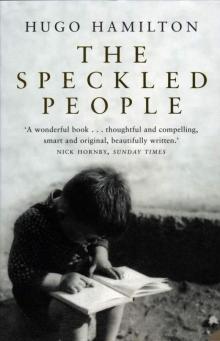 The Speckled People
The Speckled People